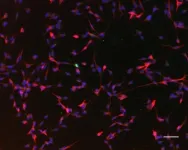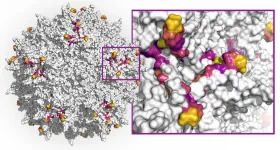(Press-News.org) LAWRENCE -- Nearly every fall, as football teams return to the field, tragic stories of players falling ill and even dying of heat trauma make the headlines. What many don't consider is that marching band members -- who don heavy uniforms and perform in the same sweltering temperatures -- may also be at risk.
A study led by the University of Kansas has measured core temperatures, hydration and sweat levels of marching band members and found that they are very much at risk and deserve access to athletic trainers for their safety -- just as players do.
The study used high tech methods to gauge band members' body core temperatures during practices and performances. The results show that, while the performers often do their best to stay hydrated, the risks are such that policies should be enacted to respond when they suffer heat illnesses. The results also show that bands and institutions should start conversations on how to provide access to trainers and prevent heat illness from becoming tragic.
"Just how hot they got while playing was a bit surprising," said Dawn Emerson, assistant professor in physical therapy and rehabilitation science at the KU Medical Center and the study's lead author. "We're used to working with football, track, soccer and the traditional fall sports for heat illnesses. Anecdotally, we were aware that band members could overheat, but there were really no studies to confirm that, which was what we wanted to do."
The study confirming those risks was published in the Journal of Athletic Training. It was authored by Emerson, Toni Torres-McGehee, Susan Yeargin, Nancy Uriegas, Allison Smith, Samantha Weber, Rebecca Hirschhorn and Cormac Cannon of the University of South Carolina; and Melani Kelly of KU.
The study looked at 10 members of bands at KU and South Carolina. About six hours before performance, the researchers had the band members swallow a pill that was capable of transmitting data on body core temperature to a receiver unit. The researchers also recorded activity time and intensity, the type of ground surface they performed on, as well as hydration characteristics like fluid volume, sweat rate, urine specific gravity and percent body mass loss. The researchers also looked at the band members' medical history, including medications taken and previous exertional heat illness. Researchers took measurements before, during and after practices and several performances.
While members of both bands experienced often dangerously high core temperatures, there were several notable differences. South Carolina generally has a hotter climate, but the highest recorded temperatures were recorded in Kansas. That is likely due to the fact that KU's band practices on a black top surface and performs half-time shows on an artificial turf field. Both radiate more heat than South Carolina's natural grass surfaces, Emerson said.
The bands in the study, like many, require heavy uniforms including jackets, hats and gloves during performances and may not have a summer or hot weather alternative. That can raise core temperatures and be exacerbated by physical exertion including covering large areas during drills, carrying heavy equipment and expending a large amount of air while playing instruments.
"The biggest high core temperature factor we found was environment, like playing on hot surfaces and in heavy uniforms," Emerson said.
The sheer length of days was also a contributing factor to risk of heat illness. To prepare for an 11 a.m. kickoff, band members often rehearsed from 6 to 9 a.m., performed in pregame activities, then played during the game, including halftime performances -- all of which could add up to days approaching nine hours with very few breaks.
The study also found that while water was provided during games, band members had to provide their own water during practices. However, there often was not sufficient periods for rest or water breaks. Still, most study participants demonstrated they were aware of the importance of maintaining good fluid levels and drank well during practices and performances, though often came to performances overhydrated.
"They did a pretty good job of hydrating, even though they weren't always matching their sweat rates," Emerson said.
In addition to excess heat, the study found band members were prone to other risk factors. Many reported not sleeping well and/or drinking alcohol the night before performances -- both of which could lead to higher chances of dehydration. Others took medications that can alter thermoregulation.
Emerson, a former high school and college clarinet and bassoon player, said she saw her fellow bandmates suffer heat exhaustion and wanted to provide a research base to address the risks.
With data confirming the risk of heat illness that band members face, the researchers say they hope to encourage bands across the country to consider forming policies on how to address the issue.
While there is no governing body similar to the NCAA, Emerson said her group has shared their findings with band directors at the respective institutions and musicians' organizations that can advocate for access to athletic trainers.
Band directors may be aware that heat illness is a possibility, but not have the training or education to know how to properly schedule hydration breaks or implement policies on how to respond if a member experiences an emergency. Bands also very rarely have entrance exams or physicals that are common from youth sports on to determine if someone is healthy enough to compete or at risk of heat illness or injury.
"That's not always the band director's job. They know they need breaks, but are not necessarily familiar with the sport recommendations for hydration or other things they could potentially change to reduce risk," Emerson said. "That's what we do as athletic trainers and how we can help, by looking for those people who have risk factors and help address that and inform policies that could help."
The research team is continuing with studies that surveyed band members from across the country on heat illnesses experienced, medical history, eating disorder risk and other injury risks they have experienced. Preliminary results have shown that risks go far beyond musculoskeletal injuries and the need for access to care is real.
INFORMATION:
A study led by researchers at Baylor College of Medicine reveals a novel role of the steroid receptor coactivator 3 (SRC-3/NCOA3), a protein crucial for steroid hormone function and a prognostic marker for aggressive human breast and other cancers.
The team discovered that SRC-3 also regulates human immune T regulatory cells (Tregs), which contribute to the regulation of the body's immunological activity by suppressing the function of other immune cells, including those involved in fighting cancer. The study, which appears in the journal Scientific Reports, shows that Tregs whose SRC-3 function was eliminated failed to suppress the activity of other immune cells in the lab. The authors anticipate that their findings ...
The golden-mantled ground squirrel (Callospermophilus lateralis) is a popular sight among tourists in the Rocky Mountains--the small rodent is a photogenic creature with a striped back and pudgy cheeks that store seeds and other food.
But there's a reality that Instagram photos don't capture, said Christy McCain, an ecologist at the University of Colorado Boulder. In a new study spanning nearly 13 years, she and her colleagues discovered that the ground squirrel has joined many other small mammals in Colorado's Rocky Mountains that are making an ominous trek: They're climbing uphill to avoid warming temperatures in the state brought on by climate change.
"It's frightening," ...
Globular clusters are extremely dense stellar systems, in which stars are packed closely together. They are also typically very old -- the globular cluster that is the focus of this study, NGC 6397, is almost as old as the Universe itself. It resides 7800 light-years away, making it one of the closest globular clusters to Earth. Because of its very dense nucleus, it is known as a core-collapsed cluster.
When Eduardo Vitral and Gary A. Mamon of the Institut d'Astrophysique de Paris set out to study the core of NGC 6397, they expected to find evidence for an "intermediate-mass" black hole (IMBH). These are smaller than the supermassive black holes that lie at the cores of large galaxies, but larger than stellar-mass black holes ...
Rheumatic heart disease (RHD) develops as a long term complication of childhood streptococcal angina. Latent RHD can be detected with echocardiography years before it becomes symptomatic. RHD is curable when treated early with medication.
RHD is responsible for over 300 000 deaths worldwide each year, accounting for just over two-thirds of all deaths from valvular heart diseases. RHD is disproportionally prevalent across sub-Saharan Africa, South Asia and the Pacific Islands and largely a phenomenon of marginalized communities in developing and emerging countries whereas ...
Millions of tonnes of plastic waste find their way into the ocean every year. A team of researchers from the Institute for Advanced Sustainability Studies (IASS) in Potsdam has investigated the role of regional ocean governance in the fight against marine plastic pollution, highlighting why regional marine governance should be further strengthened as negotiations for a new global agreement continue.
In recent years, images of whales and sea turtles starving to death after ingesting plastic waste or becoming entangled in so-called ghost nets have led to a growing ...
Domestic cats are a major threat to wild species, including birds and small mammals. But researchers reporting in the journal Current Biology on February 11 now have evidence that some simple strategies can help to reduce cats' environmental impact without restricting their freedom. Their studies show that domestic cats hunt less when owners feed them a diet including plenty of meat proteins. Equally, it helps to play with them each day in ways that allow cats to mimic hunting.
"While keeping cats indoors is the only sure-fire way to prevent hunting, some owners ...
Domestic cats hunt wildlife less if owners play with them daily and feed them a meat-rich food, new research shows.
Hunting by cats is a conservation and welfare concern, but methods to reduce this are controversial and often rely on restricting cat behaviour in ways many owners find unacceptable.
The new study - by the University of Exeter - found that introducing a premium commercial food where proteins came from meat reduced the number of prey animals cats brought home by 36%, and also that five to ten minutes of daily play with an owner resulted ...
Cambridge, MA - February 11, 2020 - Dyno Therapeutics, a biotech company applying artificial intelligence (AI) to gene therapy, today announced a publication in Nature Biotechnology that demonstrates the use of artificial intelligence to generate an unprecedented diversity of adeno-associated virus (AAV) capsids towards identifying functional variants capable of evading the immune system, a factor that is critical to enabling all patients to benefit from gene therapies. The research was conducted in collaboration with Google Research, Harvard's Wyss Institute for Biologically Inspired Engineering and the Harvard Medical School laboratory of George M. Church, Ph.D., a Dyno scientific co-founder. The publication is entitled "Deep diversification ...
Natural compounds found in apples and other fruits may help stimulate the production of new brain cells, which may have implications for learning and memory, according to a END ...
(Boston) -- Adeno-associated viruses (AAVs) have become promising vehicles for delivering gene therapies to defective tissues in the human body because they are non-pathogenic and can transfer therapeutic DNA into target cells. However, while the first gene therapy products approved by the Federal Drug Administration (FDA) use AAV vectors and others are likely to follow, AAV vectors still have not reached their full potential to meet gene therapeutic challenges.
First, currently used AAV capsids - the spherical protein structures enveloping the virus' single-stranded DNA genome which can be modified to encode therapeutic genes - are limited in their ability to specifically hone in on the tissue affected by a disease and their wider distribution throughout ...






